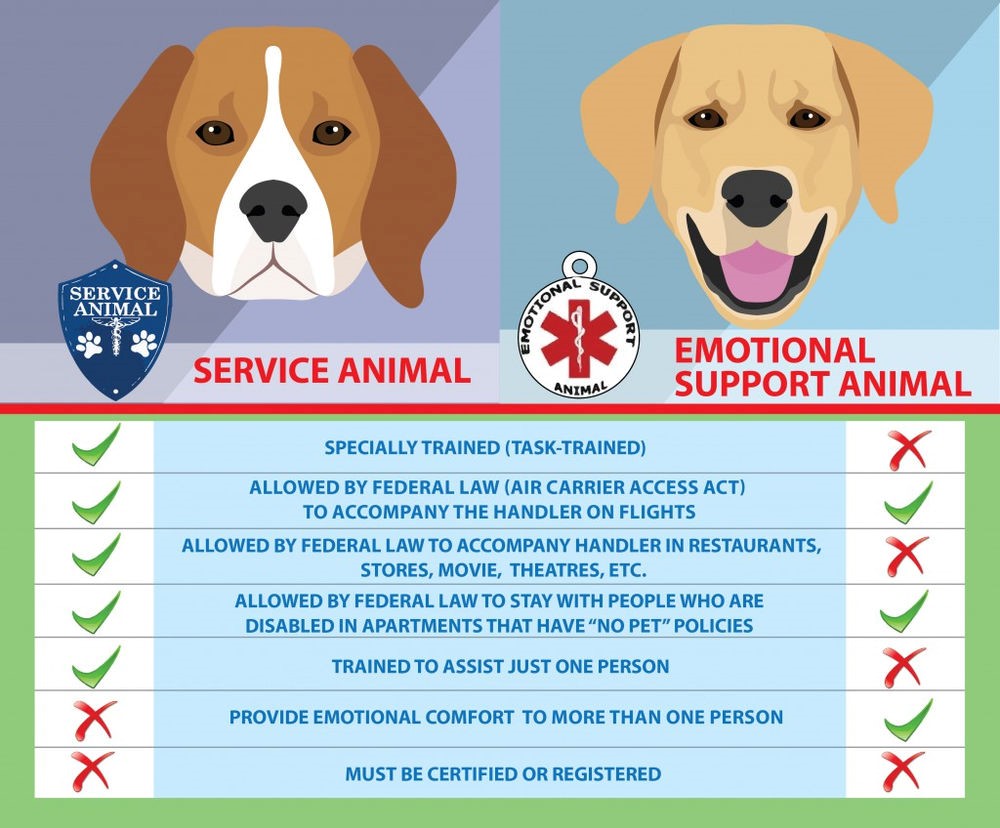Emotional support animals (ESAs) have become an essential part of many people’s lives, offering comfort and companionship to those in need. With new federal rules in place, it’s crucial to understand what these changes mean for ESA owners and how they can navigate this evolving landscape. Let’s dive into the details of these new regulations and their impact.
Key Takeaways
Emotional support animals are no longer recognized by airlines under the Air Carrier Access Act, meaning they are treated as regular pets for travel purposes.
The Fair Housing Act continues to protect ESA owners, ensuring they can live with their animals in housing that otherwise prohibits pets.
To qualify for an ESA, a licensed mental health professional must provide documentation stating the animal’s necessity for the owner’s mental health.
Landlords must make reasonable accommodations for ESA owners, but can require documentation and may deny accommodation if the animal poses a threat.
ESA owners should stay informed about their rights and responsibilities under federal and state laws to avoid potential legal issues.
Introduction to New Federal Rules on Emotional Support Animals
In recent years, the rules governing emotional support animals have undergone significant changes. These changes aim to clarify the distinction between service animals and emotional support animals, and to address concerns from airlines, landlords, and other stakeholders. By understanding these new rules, ESA owners can ensure they are compliant and continue to benefit from the companionship of their support animals.
“Emotional Support Animal (ESA) Policies …” from familycarepa.com and used with no modifications.
Overview of Recent Changes
The most notable change in federal rules regarding ESAs is the updated guidelines from the Department of Transportation (DOT) concerning air travel. Previously, ESAs were granted the same privileges as service animals, allowing them to accompany their owners in aircraft cabins without additional fees. However, this is no longer the case.
Airlines are no longer required to recognize ESAs as service animals.
ESAs must now travel as regular pets, subject to the airline’s pet policies and fees.
Owners must provide proper documentation from a licensed mental health professional to qualify for an ESA under the Fair Housing Act.
These changes have sparked discussions among ESA owners, airlines, and housing providers about the implications for individuals who rely on emotional support animals for their well-being.
Purpose of the New Rules
The primary goal of the new federal rules is to create a clear distinction between service animals and emotional support animals. Service animals, typically dogs, are trained to perform specific tasks for individuals with disabilities. In contrast, ESAs provide comfort and emotional support without specific training.
By distinguishing between these two types of animals, the rules aim to prevent abuse of the system and ensure that individuals with legitimate needs receive the necessary accommodations. Furthermore, the changes address concerns from airlines and housing providers about the potential for untrained animals to pose safety and health risks.
Understanding Emotional Support Animals
To fully grasp the implications of the new federal rules, it’s essential to understand what emotional support animals are and their role in supporting individuals with mental health conditions.
Definition and Role
Emotional support animals are pets that provide comfort and companionship to individuals experiencing mental or emotional challenges. Unlike service animals, ESAs do not require specialized training to perform specific tasks. Instead, their presence alone helps alleviate symptoms of anxiety, depression, and other mental health conditions.
Difference Between ESAs and Service Animals
It’s important to differentiate between ESAs and service animals, as they serve distinct purposes and are subject to different regulations. Service animals, such as guide dogs for the visually impaired, are trained to perform specific tasks that assist individuals with disabilities. These animals are protected under the Americans with Disabilities Act (ADA) and are allowed in public spaces.
In contrast, ESAs do not have the same level of access and are primarily covered under the Fair Housing Act, which allows them to live with their owners in housing that may otherwise prohibit pets.
Previous Federal Regulations for Emotional Support Animals
The Air Carrier Access Act previously recognized ESAs as service animals for air travel.
The Fair Housing Act has long protected ESA owners, requiring landlords to make reasonable accommodations.
Documentation from a licensed mental health professional has been necessary to qualify for an ESA.
Overview of Past Regulations
Before the recent changes, emotional support animals enjoyed certain privileges under federal regulations. The Air Carrier Access Act allowed ESA owners to travel with their animals in aircraft cabins without additional fees, treating them similarly to service animals. This was a significant benefit for individuals who rely on their ESAs for emotional support during travel.
How Regulations Have Evolved
Over time, concerns about the misuse of ESA privileges and the potential risks posed by untrained animals led to a reevaluation of the regulations. The updated rules aim to address these concerns while ensuring that individuals with legitimate needs continue to receive the necessary support.
As a result, airlines are no longer required to accommodate ESAs as service animals, and ESA owners must navigate new guidelines for air travel. However, the Fair Housing Act continues to protect ESA owners, ensuring they can live with their animals in housing that otherwise prohibits pets.
Details of the New Federal Rules
The new federal rules bring significant changes to how emotional support animals are recognized and accommodated. Understanding these changes is crucial for ESA owners to ensure compliance and avoid potential issues.
In the next section, we will explore the specific changes implemented by the new rules, the reasons behind these changes, and their impact on various stakeholders.
Specific Changes Implemented
The most significant change in the new federal rules is the reclassification of emotional support animals in the context of air travel. Under the updated guidelines from the Department of Transportation, airlines are no longer required to treat ESAs as service animals. This means that emotional support animals are now subject to the same policies as regular pets when it comes to air travel. As a result, ESA owners may face additional fees and restrictions when flying with their animals.
Another important change is the emphasis on documentation. To qualify for an ESA under the Fair Housing Act, owners must provide a letter from a licensed mental health professional. This letter must confirm that the individual has a mental health condition and that the ESA provides necessary support. Landlords are entitled to request this documentation, and ESA owners should be prepared to provide it when seeking accommodation.
Reasons Behind the Regulatory Changes
The decision to update the federal rules regarding emotional support animals was driven by several factors. One of the main reasons was the increasing reports of incidents involving untrained animals on flights. Airlines expressed concerns about safety and the potential for disruptions caused by animals that were not adequately trained to behave in a public setting. By treating ESAs as regular pets, airlines aim to mitigate these risks and ensure a safer travel environment for all passengers.
Impact of New Rules on Various Stakeholders
The new rules have far-reaching implications for ESA owners, landlords, housing providers, and airlines. Understanding these impacts is crucial for navigating the changing landscape of ESA regulations.
Implications for ESA Owners
For ESA owners, the new rules mean adjusting to the reality that air travel with their animals may become more challenging and costly. Without the same privileges as service animals, ESA owners must now adhere to the pet policies of individual airlines, which may include size restrictions, carrier requirements, and additional fees.
In the housing context, ESA owners continue to benefit from the protections offered by the Fair Housing Act. However, they must be diligent in obtaining and maintaining the necessary documentation from a licensed mental health professional. This documentation is crucial for securing housing accommodations and avoiding potential disputes with landlords.
Moreover, ESA owners should stay informed about their rights and responsibilities under both federal and state laws. Understanding the nuances of these emotional support animal laws will help them navigate any challenges that may arise and ensure they are compliant with all legal requirements.
Ensure you have an up-to-date ESA letter from a licensed mental health professional.
Familiarize yourself with the pet policies of airlines you plan to travel with.
Communicate clearly with landlords about your ESA and provide necessary documentation.
Stay informed about changes in federal and state ESA regulations.
Effects on Landlords and Housing Providers
“Landlords must provide reasonable accommodations for ESA owners, but they have the right to request documentation and may deny accommodation if the animal poses a threat to health or safety.”
For landlords and housing providers, the new rules clarify their rights and responsibilities when accommodating ESA owners. While the Fair Housing Act requires them to make reasonable accommodations, they can request documentation from a licensed mental health professional to verify the need for an ESA.
Additionally, landlords have the right to deny accommodation if the ESA poses a direct threat to the health or safety of others, or if it would cause significant property damage. This provides a level of protection for landlords while ensuring that individuals with legitimate needs continue to receive the necessary support.
Therefore, landlords should establish clear policies for handling ESA requests and ensure that their staff is trained to comply with the Fair Housing Act. By doing so, they can avoid potential legal disputes and maintain a harmonious living environment for all tenants.
Airlines’ Policies and Travelers with ESAs
The changes in airline policies regarding ESAs have been a significant adjustment for travelers. Without the recognition as service animals, ESAs are now subject to each airline’s specific pet policies. This can mean additional fees, restrictions on the types of animals allowed, and requirements for carriers or kennels during the flight.
Travelers with ESAs should contact their airline in advance to understand the specific requirements and ensure they are prepared for their journey. This preparation includes having the necessary documentation, understanding size and weight restrictions, and being ready to pay any applicable fees.
Compliance and What ESA Owners Need to Know
Compliance with the new federal rules is essential for ESA owners to avoid potential legal issues and ensure they continue to receive the support they need. Understanding the requirements and taking proactive steps can help ease the transition to the new regulations.
One of the most critical aspects of compliance is maintaining up-to-date documentation from a licensed mental health professional. This documentation should clearly state the individual’s need for an ESA and the role the animal plays in supporting their mental health. It is advisable to review this documentation regularly and update it as needed.
“Keep your ESA documentation current and readily available to provide to airlines or landlords when requested.”
ESA owners should also familiarize themselves with the specific requirements of airlines and housing providers. By understanding these requirements, they can avoid potential conflicts and ensure a smooth experience when traveling or securing housing accommodations.
Steps for ESA Owners to Comply
To comply with the new federal rules, ESA owners should take the following steps:
Obtain a current ESA letter from a licensed mental health professional.
Familiarize yourself with airline pet policies and prepare for any additional fees or requirements.
Communicate openly with landlords and provide necessary documentation when requested.
Stay informed about changes in federal and state ESA regulations to ensure ongoing compliance.
Guidance for Landlords and Housing Providers
Landlords and housing providers can also take steps to ensure compliance with the new federal rules. By understanding their rights and responsibilities under the Fair Housing Act, they can create a supportive environment for ESA owners while protecting their interests.
Some key steps for landlords include:
Develop clear policies for handling ESA requests and ensure staff is trained on these policies.
Request documentation from a licensed mental health professional to verify the need for an ESA.
Assess each ESA request individually and consider the potential impact on the health and safety of other tenants.
Practical Advice for ESA Owners
Living with an emotional support animal can bring immense comfort and joy, but it also comes with responsibilities. By following some practical advice, ESA owners can ensure a positive experience for themselves and their animals.
First and foremost, maintaining open communication with airlines and landlords is essential. Being proactive in providing documentation and understanding policies can help avoid misunderstandings and conflicts.
Keep your ESA’s documentation current and easily accessible.
Plan ahead when traveling, and contact airlines in advance to understand their requirements.
Respect the rights of landlords and other tenants by ensuring your ESA is well-behaved and does not pose a threat.
By taking these steps, ESA owners can enjoy the companionship of their animals while navigating the new federal rules with confidence and ease.
How to Obtain Necessary Documentation
Securing the right documentation for your emotional support animal (ESA) is a critical step in ensuring you receive the accommodations you need. This documentation typically comes in the form of an ESA letter from a licensed mental health professional. This letter should clearly state your need for the ESA and how it helps alleviate symptoms of a mental health condition.
“An ESA letter must be issued by a licensed mental health professional and should include their license number, type, and date of issue.”
To obtain this letter, schedule an appointment with a mental health professional. During the session, discuss your mental health challenges and how your ESA provides support. If the professional deems it appropriate, they will provide you with the necessary documentation.
Keep your ESA letter updated, as many landlords and airlines require a current document. Renew it annually or as needed to ensure continued compliance with federal regulations.
Tips for Traveling with an ESA
Traveling with an emotional support animal requires careful planning and adherence to specific airline policies. Since ESAs are no longer recognized as service animals, they must comply with each airline’s pet policies.
Before booking your flight, contact the airline to understand their requirements. Some airlines may have restrictions on the types of animals allowed, carrier specifications, and additional fees. Knowing these details in advance will help you prepare for a smooth journey.
Ensure your ESA is comfortable in a carrier, especially for longer flights. Familiarize them with the carrier well before your travel date to reduce stress and anxiety. Bring essentials like water, food, and a blanket to keep your ESA comfortable during the flight.
Arrive at the airport early to allow extra time for check-in and security procedures. This will give you ample time to address any unforeseen issues and ensure a stress-free start to your trip.
“Research the specific pet policies of your airline and prepare your ESA for travel to ensure a smooth journey.”
Conclusion and Future Outlook
As we navigate the new federal rules for emotional support animals, it’s important to stay informed and proactive. These changes aim to clarify the distinction between ESAs and service animals while ensuring that individuals with legitimate needs continue to receive necessary support.
Summary of Key Changes
The most significant changes include the reclassification of ESAs in air travel, requiring them to comply with pet policies rather than being treated as service animals. The Fair Housing Act continues to protect ESA owners, but they must provide documentation from a licensed mental health professional to qualify for accommodations.
Future Considerations in ESA Regulations
As the landscape of emotional support animal regulations evolves, it’s crucial for ESA owners, airlines, and landlords to stay informed about any changes. Future considerations may include further clarifications on documentation requirements and additional guidance on accommodating ESAs in public spaces.
Continued advocacy and education are essential to ensure that individuals with mental health needs receive the support they require while balancing the interests of all stakeholders involved.
Frequently Asked Questions (FAQ)
Understanding the new federal rules for emotional support animals can be challenging. Here are some common questions and answers to help clarify these regulations.
What is the definition of an emotional support animal?
An emotional support animal is a pet that provides comfort and emotional support to individuals experiencing mental or emotional challenges. Unlike service animals, ESAs do not require specialized training and are primarily covered under the Fair Housing Act for housing accommodations.
How do the new rules affect airline travel with ESAs?
ESAs are no longer recognized as service animals for air travel.
They must comply with each airline’s pet policies, including fees and restrictions.
Owners should contact airlines in advance to understand specific requirements.
The changes mean ESA owners must navigate new guidelines and potentially face additional fees when flying with their animals. It’s essential to plan ahead and be aware of each airline’s policies.
By understanding these changes, ESA owners can ensure a smooth travel experience and avoid potential issues.
What are the responsibilities of landlords under the new rules?
Landlords must provide reasonable accommodations for ESA owners under the Fair Housing Act. They can request documentation from a licensed mental health professional to verify the need for an ESA. However, landlords have the right to deny accommodation if the ESA poses a direct threat to health or safety or would cause significant property damage.
By establishing clear policies and training staff on ESA regulations, landlords can ensure compliance and maintain a harmonious living environment for all tenants.
How can ESA owners stay informed about regulatory changes?
ESA owners can stay informed by regularly reviewing updates from federal agencies, consulting with legal professionals, and participating in advocacy groups. Staying connected with the ESA community can also provide valuable insights and support.






